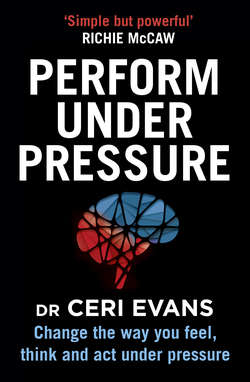Читать книгу Performance Under Pressure - Ceri Evans - Страница 40
ESC-APE vs IMP-ACT ESC-APE
ОглавлениеSome moments are just too big for us.
Sometimes, under pressure, we hit our threshold, and it’s then that our damaging APE behaviours emerge.
Most pressure arises from our fear of possible judgment. And the key elements of judgment are expectations, scrutiny and consequences (ESC).
Before we perform, people are expecting us to reach a certain standard. During our performance, we are scrutinised, often publicly. And afterwards, the quality and outcome of our performance will have consequences.
Sometimes we will be affected by one element more than the others, but generally they work together as a tight, inescapable sequence. As the level of expectations, scrutiny and consequences rises, so does the pressure. And it works in the opposite direction: if expectations, scrutiny or consequences are reduced or taken away, pressure evaporates.
More expectations and scrutiny always mean bigger and wider-ranging consequences. These consequences extend beyond success and failure to include material outcomes such as salary increases and promotion. And these material outcomes are rocketed upwards by media reactions and – perhaps the ultimate judgment – the impact on our reputation. The higher the level we are operating at, the more we have to lose through consequences.
Not all moments are equal. Every elite performer has had moments that carried greater significance, when they failed to cope.
Most people, when they go to work or undertake an activity, are not looking for ESC. In fact, most people try to avoid judgment as much as possible. The less ESC there is, the more comfortable they are. This returns us to the idea that operating when we are uncomfortable is at the heart of performance under pressure.
The external origins of pressure – ESC – plus the most unhelpful behaviours under pressure – APE – create the ESC-APE model. There are some moments that carry too much pressure for us to bear because of the level of ESC, and this level of discomfort causes us to go APE. Rather than thinking clearly, we act impulsively out of emotional tension. We avoid the discomfort through aggressive or passive behaviours, or by escaping from the situation altogether.
Try applying the ESC-APE model to your personal performance history. If you’re honest, looking back, which behaviours are you least proud of? Which behaviours have damaged your reputation the most? Can you recognise how expectations, scrutiny and consequences created pressure that affected your behaviour? Perhaps you stepped out onto a bigger ‘performance stage’ than normal, with a larger audience watching to see whether you could cope. But instead of performing at your best, you got loud, boisterous, and belligerent; or you cried off and said you were unwell when you really could have turned up; or you performed, but you were quiet and restrained and just never got going.
